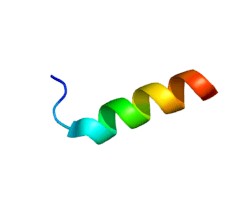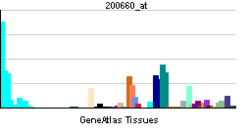S100A11
| S100 calcium-binding protein A11 | |||||||||||||
|---|---|---|---|---|---|---|---|---|---|---|---|---|---|
 Rendering based on PDB 1V4Z. | |||||||||||||
| |||||||||||||
| Identifiers | |||||||||||||
| Symbols | S100A11 ; HEL-S-43; MLN70; S100C | ||||||||||||
| External IDs | OMIM: 603114 MGI: 3645720 HomoloGene: 55916 GeneCards: S100A11 Gene | ||||||||||||
| |||||||||||||
| RNA expression pattern | |||||||||||||
 | |||||||||||||
| More reference expression data | |||||||||||||
| Orthologs | |||||||||||||
| Species | Human | Mouse | |||||||||||
| Entrez | 6282 | 277089 | |||||||||||
| Ensembl | ENSG00000163191 | ENSMUSG00000027907 | |||||||||||
| UniProt | P31949 | P50543 | |||||||||||
| RefSeq (mRNA) | NM_005620 | NM_016740 | |||||||||||
| RefSeq (protein) | NP_005611 | NP_058020 | |||||||||||
| Location (UCSC) | Chr 1: 152 – 152.02 Mb | Chr 3: 93.52 – 93.53 Mb | |||||||||||
| PubMed search | |||||||||||||
S100 calcium-binding protein A11 (S100A11) is a protein that in humans is encoded by the S100A11 gene.[1][2]
Function
The protein encoded by this gene is a member of the S100 family of proteins containing 2 EF-hand calcium-binding motifs. S100 proteins are localized in the cytoplasm and/or nucleus of a wide range of cells, and involved in the regulation of a number of cellular processes such as cell cycle progression and differentiation. S100 genes include at least 13 members which are located as a cluster on chromosome 1q21. This protein may function in motility, invasion, and tubulin polymerization. Chromosomal rearrangements and altered expression of this gene have been implicated in tumor metastasis.[2]
Interactions
S100A11 has been shown to interact with Nucleolin[3] and S100B.[4]
References
- ↑ Wicki R, Marenholz I, Mischke D, Schäfer BW, Heizmann CW (March 1997). "Characterization of the human S100A12 (calgranulin C, p6, CAAF1, CGRP) gene, a new member of the S100 gene cluster on chromosome 1q21". Cell Calcium 20 (6): 459–64. doi:10.1016/S0143-4160(96)90087-1. PMID 8985590. Vancouver style error (help)
- ↑ 2.0 2.1 "Entrez Gene: S100A11 S100 calcium binding protein A11".
- ↑ Sakaguchi M, Miyazaki M, Takaishi M, Sakaguchi Y, Makino E, Kataoka N et al. (November 2003). "S100C/A11 is a key mediator of Ca(2+)-induced growth inhibition of human epidermal keratinocytes". J. Cell Biol. 163 (4): 825–35. doi:10.1083/jcb.200304017. PMC 2173690. PMID 14623863.
- ↑ Deloulme JC, Assard N, Mbele GO, Mangin C, Kuwano R, Baudier J (November 2000). "S100A6 and S100A11 are specific targets of the calcium- and zinc-binding S100B protein in vivo". J. Biol. Chem. 275 (45): 35302–10. doi:10.1074/jbc.M003943200. PMID 10913138.
Further reading
- Rasmussen HH, van Damme J, Puype M, Gesser B, Celis JE, Vandekerckhove J (1993). "Microsequences of 145 proteins recorded in the two-dimensional gel protein database of normal human epidermal keratinocytes.". Electrophoresis 13 (12): 960–9. doi:10.1002/elps.11501301199. PMID 1286667.
- Tomasetto C, Régnier C, Moog-Lutz C, Mattei MG, Chenard MP, Lidereau R et al. (1996). "Identification of four novel human genes amplified and overexpressed in breast carcinoma and localized to the q11-q21.3 region of chromosome 17.". Genomics 28 (3): 367–76. doi:10.1006/geno.1995.1163. PMID 7490069. Vancouver style error (help)
- Schäfer BW, Wicki R, Engelkamp D, Mattei MG, Heizmann CW (1995). "Isolation of a YAC clone covering a cluster of nine S100 genes on human chromosome 1q21: rationale for a new nomenclature of the S100 calcium-binding protein family.". Genomics 25 (3): 638–43. doi:10.1016/0888-7543(95)80005-7. PMID 7759097. Vancouver style error (help)
- Tanaka M, Adzuma K, Iwami M, Yoshimoto K, Monden Y, Itakura M (1995). "Human calgizzarin; one colorectal cancer-related gene selected by a large scale random cDNA sequencing and northern blot analysis.". Cancer Lett. 89 (2): 195–200. doi:10.1016/0304-3835(94)03687-E. PMID 7889529.
- Mailliard WS, Haigler HT, Schlaepfer DD (1996). "Calcium-dependent binding of S100C to the N-terminal domain of annexin I.". J. Biol. Chem. 271 (2): 719–25. doi:10.1074/jbc.271.2.719. PMID 8557678.
- Seemann J, Weber K, Gerke V (1997). "Annexin I targets S100C to early endosomes.". FEBS Lett. 413 (1): 185–90. doi:10.1016/S0014-5793(97)00911-3. PMID 9287141.
- Inada H, Naka M, Tanaka T, Davey GE, Heizmann CW (1999). "Human S100A11 exhibits differential steady-state RNA levels in various tissues and a distinct subcellular localization.". Biochem. Biophys. Res. Commun. 263 (1): 135–8. doi:10.1006/bbrc.1999.1319. PMID 10486266.
- Réty S, Osterloh D, Arié JP, Tabaries S, Seeman J, Russo-Marie F et al. (2000). "Structural basis of the Ca(2+)-dependent association between S100C (S100A11) and its target, the N-terminal part of annexin I.". Structure 8 (2): 175–84. doi:10.1016/S0969-2126(00)00093-9. PMID 10673436. Vancouver style error (help)
- Sakaguchi M, Miyazaki M, Inoue Y, Tsuji T, Kouchi H, Tanaka T et al. (2000). "Relationship between contact inhibition and intranuclear S100C of normal human fibroblasts.". J. Cell Biol. 149 (6): 1193–206. doi:10.1083/jcb.149.6.1193. PMC 2175115. PMID 10851017.
- Deloulme JC, Assard N, Mbele GO, Mangin C, Kuwano R, Baudier J (2001). "S100A6 and S100A11 are specific targets of the calcium- and zinc-binding S100B protein in vivo.". J. Biol. Chem. 275 (45): 35302–10. doi:10.1074/jbc.M003943200. PMID 10913138.
- Ruse M, Lambert A, Robinson N, Ryan D, Shon KJ, Eckert RL (2001). "S100A7, S100A10, and S100A11 are transglutaminase substrates.". Biochemistry 40 (10): 3167–73. doi:10.1021/bi0019747. PMID 11258932.
- Kondo A, Sakaguchi M, Makino E, Namba M, Okada S, Huh NH (2002). "Localization of S100C immunoreactivity in various human tissues.". Acta Med. Okayama 56 (1): 31–4. PMID 11873942.
- Bianchi R, Giambanco I, Arcuri C, Donato R (2003). "Subcellular localization of S100A11 (S100C) in LLC-PK1 renal cells: Calcium- and protein kinase c-dependent association of S100A11 with S100B and vimentin intermediate filaments.". Microsc. Res. Tech. 60 (6): 639–51. doi:10.1002/jemt.10305. PMID 12645011.
- Broome AM, Ryan D, Eckert RL (2003). "S100 protein subcellular localization during epidermal differentiation and psoriasis.". J. Histochem. Cytochem. 51 (5): 675–85. doi:10.1177/002215540305100513. PMID 12704215.
- Sakaguchi M, Miyazaki M, Takaishi M, Sakaguchi Y, Makino E, Kataoka N et al. (2004). "S100C/A11 is a key mediator of Ca(2+)-induced growth inhibition of human epidermal keratinocytes.". J. Cell Biol. 163 (4): 825–35. doi:10.1083/jcb.200304017. PMC 2173690. PMID 14623863.
- Broome AM, Eckert RL (2004). "Microtubule-dependent redistribution of a cytoplasmic cornified envelope precursor.". J. Invest. Dermatol. 122 (1): 29–38. doi:10.1046/j.0022-202X.2003.22105.x. PMID 14962086.
- Sakaguchi M, Miyazaki M, Sonegawa H, Kashiwagi M, Ohba M, Kuroki T et al. (2004). "PKCalpha mediates TGFbeta-induced growth inhibition of human keratinocytes via phosphorylation of S100C/A11.". J. Cell Biol. 164 (7): 979–84. doi:10.1083/jcb.200312041. PMC 2172059. PMID 15051732.
- Mori M, Shimada H, Gunji Y, Matsubara H, Hayashi H, Nimura Y et al. (2004). "S100A11 gene identified by in-house cDNA microarray as an accurate predictor of lymph node metastases of gastric cancer.". Oncol. Rep. 11 (6): 1287–93. doi:10.3892/or.11.6.1287. PMID 15138568.